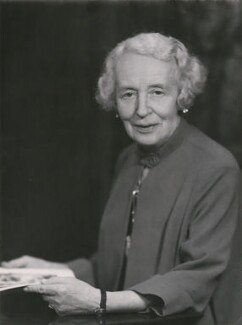

Partner Isaline Blew Horner
Queer Places:
University of Cambridge, 4 Mill Ln, Cambridge CB2 1RZ
University of Oxford, Oxford, Oxfordshire OX1 3PA
30 Dawson Pl, Bayswater, London W2 4TH, UK
 Eliza Marian Butler (29 December 1885 – 13 November 1959),[1]
who published as E. M. Butler and Elizabeth M. Butler, was an
English scholar of German,
Schröder Professor of German at the
University of Cambridge from 1945. Her most influential book was The
Tyranny of Greece over Germany (1935),[2]
in which she wrote that Germany has had "too much exposure to Ancient Greek
literature and art. The result was that the German mind had succumbed to 'the
tyranny of an ideal'. The German worship of Ancient Greece had emboldened the
Nazis to remake Europe in their image."[3]
It was controversial in Britain and its translation was banned in Germany.[4]
Eliza Marian Butler (29 December 1885 – 13 November 1959),[1]
who published as E. M. Butler and Elizabeth M. Butler, was an
English scholar of German,
Schröder Professor of German at the
University of Cambridge from 1945. Her most influential book was The
Tyranny of Greece over Germany (1935),[2]
in which she wrote that Germany has had "too much exposure to Ancient Greek
literature and art. The result was that the German mind had succumbed to 'the
tyranny of an ideal'. The German worship of Ancient Greece had emboldened the
Nazis to remake Europe in their image."[3]
It was controversial in Britain and its translation was banned in Germany.[4]
Eliza Butler, known as "Elsie", was born in Bardsea, Lancashire in a family of Irish ancestry.[4] She was the daughter of Theobald FitzWalter Butler and Catherine Elizabeth Barraclough. She was educated by a Norwegian governess (from whom she learned German) and subsequently in Hannover from age 11, Paris from age 15, the school of domestic science at Reifenstein Abbey from age 18, and Newnham College, Cambridge from 21.[4] As a teenager, she watched Kaiser Wilhelm II inspect his troops. In the First World War she worked as an interpreter and nurse in Scottish units on the Russian and Macedonian fronts (she had learned Russian from Jane Harrison)[2] and treated the victims of the German assault.[3]
She was educated at Bonn University, Bonn, Nordrhein-Westfahlen, Germany. She was an Assistant Lecturer between 1914 and 1917 at Newnham College, Cambridge University, Cambridge, Cambridgeshire, England. She was Director of Studies Modern Languages between 1920 and 1936.
From 1926 to her death Butler lived and travelled with her companion Isaline Blew Horner.[2][5][6][7] After working in hospitals, she was a Lecturer between 1929 and 1936 at Cambridge University, Cambridge, Cambridgeshire, England, and was Henry Simon Professor of German Language & Literature between 1936 and 1945 at Manchester University, Manchester, Lancashire, England.[8] She was Schröder Professor of German between 1945 and 1951 at Cambridge University, Cambridge, Cambridgeshire, England. She wrote the book Byron and Goethe. She was awarded the honorary degree of Doctor of Letters (D.Litt.) by London University, London, England, in 1957. She was awarded the honorary degree of Doctor of Letters (D.Litt.) by Oxford University, Oxford, Oxfordshire, England, in 1958. Her works include a trilogy on ritual magic and the occult, especially in the Faust legend (1948–1952).[4]
Butler also wrote novels. Her autobiography, Paper Boats, was published by William Collins, Sons in 1959, the year of her death.[4][9] She lived at 30 Dawson Place, Kensington, London W2. She died in London on 13 November 1959.[1]
She may have inspired the scholar Suzanne L. Marchand to research German Orientalism, as Marchand emphasized the political overtones of Orientalistik, in reaction to Edward Said's assumption that Germany has had a mostly "classical" interest in the Orient (Said overlooked Germany in his Orientalism).[10]
My published books: